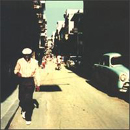 Buena Vista Social Club When our descendents look back at the music of our time, from the comfort of their space stations and flying cars, this album may well turn out to be pegged as the most influential album released in the 90s, the album that forever changed the face of music. Certainly you don't hear its influence on the radio, but you probably hear it everywhere else. It's an album that seems to connect to whomever hears it – I've heard it in record stores and bookstores, at restaurants, at apartment parties where everyone is getting high, at posh dinner parties where high society mingles, at strip clubs where fifty bucks will get you a little bit of heaven, at schools and hospitals, on airplanes and deep in the bowels of Nazi submarines, in churches and in rehab. Wait, perhaps I haven't heard it in all those places, because it occurs to me I haven't been to most of those places. My point, though, is that this magical music has crossed over to an unusually broad cross-section of people. Play it for your mother, she's wet with excitement, play it for your nephew, he's begging to keep it for show and tell, play it for your landlord and he'll let you slide on the rent, play it for your spouse or domestic partner and you'll be gettin' some hot ass for sure, within moments. It's one of those rare albums that becomes something of an instant classic, and one which has only grown in stature now that there is a documentary film available that personalizes the music all the more. And surprisingly, it hasn't tired much with the overexposure. The few uninitiated folk will appreciate a little introduction. Ry Cooder was the brains behind the effort, originally intending to record an album with some African musicians in Cuba. When the Africans didn't show up (typical Africans), Cooder assembed a group of old-school Cuban musicians, many of whom were over 70 and most of which were working sorry jobs that indicated their obscurity and obsolescence. In the 40s and 50s these cats had played with the famous Cuban orchestras (I'm not talking Desi Arnaz here, chubby), but as the old style gave way to a slicker salsa-driven sound, they found themselves unemployed. The situation would be similar to discovering someone like Dizzy Gillespie working as a shoe shine, or Sarah Vaughan clerking a gift shop. Cooder tracked these people down by word of mouth and cranked the album out in less than a week in one of Havana's old recording studios. And what should have been just another good world music album became something much more special – nothing short of a resurrection of the Cuban son style, a 20th century folk music with a heavily romantic sound. The Buena Vista Social Club album mixes son, bolero, danzon, and several other lost Cuban styles as preserved by these musicians who lived and breathed it back in the day. The economic, political and geographical separation of Cuba from Western influence allowed for this "frozen in time" effect to give life to one of the most memorable albums ever released. From the opening moments of the haunting "Chan Chan" through the great romantic vibe of "Dos Gardenias," the mesmerizing "El Carretero," the intense "Candela," to the final moments of the almost cartoonishly traditional "La Bayamesa," the album hands you a big coconut full of rum and courses through you like fire through the burning tobacco of a fine Cuban cigar. (What do you mean, cultural sterotyping is out of fashion?) Those who have seen the movie will hear the voices of Ibrahim Ferrer, Omara Portuondo, Compay Segundo, and Eliades Ochoa as old friends, and hear the pristine blend of piano, guitars, percussion, strings and horns like a comforting grandparent's voice reading you to sleep. There are moments for dancing, moments for singing, moments for embracing, and moments for tooling around your impoverished city in a barely functional 50s automobile, waiting for your leader to die so that you might be able to eat again. (My insightful political commentary is quite welcome here, yes?) It's an album so addictive that there are now about a dozen spin-off releases on the market from the various participants in the group, and several of them are as good or better. If there's a downside to the album, it's that its ubiquity in so many environments has caused it to lose the appeal it once held, and I don't find myself listening to it much. But that hardly diminishes the quality. I may shake my head whenever I hear "Chan Chan" at a bookstore, but I never ask for them to change the music.
Review by Pansy Marshall |